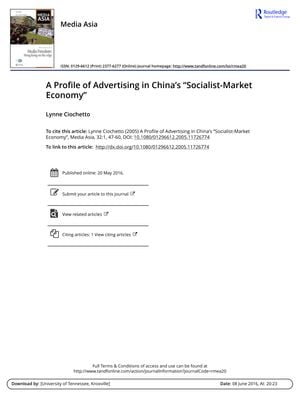A Profile of Advertising in China’s Socialist-Market Economy
January 2005
in “
Media Asia
”

TLDR Advertising in China shifted towards entertainment, favored local brands, and played a significant role in the country's move to a consumer economy.
In the 2005 document, the evolution of advertising in China was examined, showing a transition from informational to entertainment and transformational strategies, with a shift in consumer preference from foreign to local brands. Advertising expenditures reached US$13 billion by 2003, with television becoming the dominant medium, accounting for 72.3% of advertising by 2001. The Chinese market, with up to 900 million potential TV viewers and 103 million Internet users by June 2005, transitioned from industrial to consumer goods advertising. Regulations were ideologically driven, with foreign advertisers facing stricter rules. Despite challenges, foreign agencies expanded, and by the 1990s, local brands gained prominence. Advertising reflected and shaped societal values, contributing to a shift towards materialism and consumerism, with the government promoting consumption while containing Western cultural impacts. The profile of advertised products in China reflected government policies and the requirements of the emerging consumer economy, with advertising playing a key role in the country's economic transition.